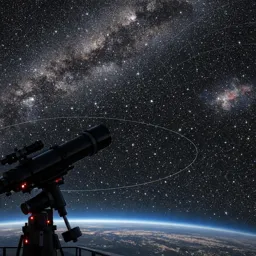What Is Dark Energy?
Dark energy is one of the most enigmatic and compelling phenomena in modern astronomy. It is a hypothetical form of energy thought to permeate all of space, exerting a force that drives the accelerated expansion of the universe. Though it comprises almost 70% of the universe’s total energy content, dark energy remains invisible and undetectable through direct observation.
The Discovery of Dark Energy
The existence of dark energy was first proposed in the late 20th century. In the 1990s, astronomers observing distant supernovae noticed that these objects were fainter than expected, implying that they were farther away than previously believed. This led to the surprising conclusion that the expansion of the universe is not slowing down, as once thought, but accelerating.
The Role of Dark Energy in the Universe
Dark energy acts as a sort of anti-gravity, counteracting the force of gravity that pulls matter together. While gravity works to slow the expansion of the universe, dark energy works against it, causing galaxies to move away from each other at ever-increasing speeds.
Theories and Models
Scientists have proposed several models to describe dark energy. The most popular is the cosmological constant, introduced by Albert Einstein, which suggests that the energy density of space remains constant over time. Other theories include dynamic fields such as quintessence, which may change over the history of the universe.
How Do Astronomers Study Dark Energy?
Although dark energy cannot be observed directly, astronomers study its effects by measuring the rate of expansion of the universe, mapping the distribution of galaxies, and observing the cosmic microwave background. These observations help refine theories and bring scientists closer to understanding this mysterious force.
Why Dark Energy Matters
Understanding dark energy is one of the biggest challenges in physics and astronomy today. It has profound implications for the fate of the universe and deepens our understanding of basic laws governing nature. Through continued research and observation, scientists hope to unlock the secrets of this puzzling phenomenon and its significance in cosmic evolution.




















